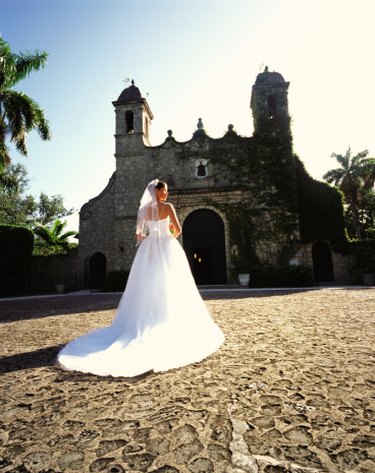Things You'll Need
Scrap fabric
Tape measure
Fabric marker
Scissors
Tracing paper

A traditional wedding involves purchasing an elegant, formal and often elaborate gown. This gown is usually either white or some shade of white, depending on the preference of the bride. Another aspect of a traditional wedding is adding a train to the gown. The train is a long length of fabric that hangs off the back of the bride's gown and drags along the floor, creating an even more formal and elegant look. If you want to have a train custom-made for your gown, you can make the process easier and less expensive by making the pattern for the train yourself.
Step 1
Decide where you want the train to start. Some trains attach near the waist of the gown, while others start higher up near the shoulders.
Video of the Day
Step 2
Put on your wedding gown and imagine the train is there, or use a scrap piece of fabric to mimic it. This will help you decide how long you want the train to be or how much you want it to drag on the floor behind you. This can vary from just barely to many feet of train. The train of Princess Diana's wedding gown in 1981 was 25 feet long.
Step 3
Outline the shape of the train where it will attach to your dress on a piece of scrap fabric using a fabric marker. Use your dress as a guide. For example, if you want the train to attach at the top of the dress and the back dips into a "V" shape, the top of the train pattern should have that same "V" shape.
Step 4
Mark the bottom of the train on your scrap fabric. Use the measurement you established in Step 2. Add several inches to the train to account for the sweeping motion of falling onto the floor.
Step 5
Create a train pattern on the scrap fabric that gradually increases in size as it goes from where it attaches to your dress to the ground. The final train should be much narrower at the top than it is at the bottom.
Step 6
Copy your pattern so far, using a large sheet of tracing paper. Cut the train pattern from the scrap fabric. Put on your wedding gown and ask a friend to hold up your mock train. At this point, you can make any necessary adjustments to the pattern, such as if you want the train a bit shorter or a bit wider at the bottom.
Video of the Day